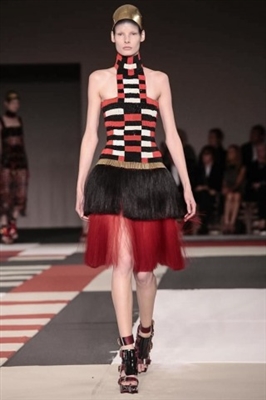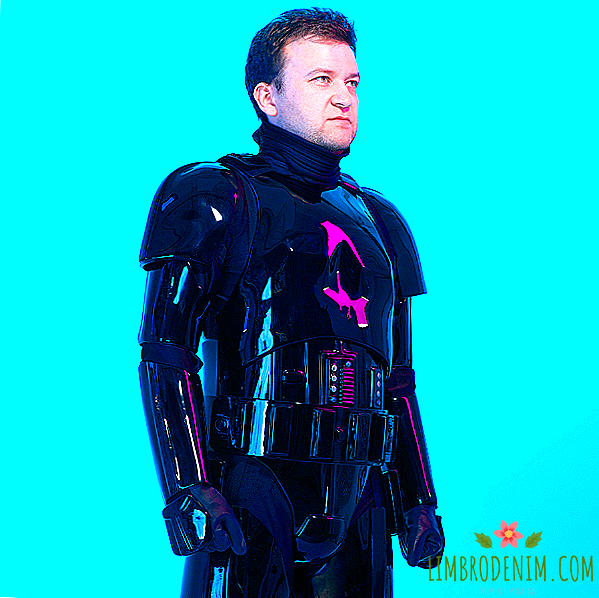11 significant events of the Olympics that changed the Games
Opening ceremony to be held today in Rio de Janeiro Summer Olympics. The Olympiad is not only a sporting, but also a cultural and political event: by the way the competitions are held, one can judge about the relations between individual countries and about the situation in the world as a whole. This year, for the first time, a team of refugees will take part in the games - and this is also an important sign of the times. We decided to recall ten more events that changed the modern Olympic Games.
1900

Women took part in the Games for the first time.
The Olympic Games in a relatively modern form were revived at the end of the XIX century. Women took part in them for the first time in 1900 and had the right to compete only in five sports: tennis, croquet, horseback riding, golf and sailing. Among the 997 Olympic athletes there were 22 women. Over time, the athletes at the Olympics became more: if in the games of 1928 women accounted for 10% of the total number of athletes, then by 1960 this figure had increased to 20%.
The first woman joined the executive committee of the IOC only in 1990. After that, in 1991, the IOC made a historic decision: now in all sports that are included in the program of the Olympic Games, women's competitions should also be held. But it’s too early to talk about full gender equality: at the Olympics in Sochi, women accounted for 40% of the total number of participants. In some countries, it is still difficult for women to participate in the Olympic Games: for example, in Saudi Arabia, women were only allowed to participate in competitions in 2012.
1936

African American Jesse Owens won four gold medals
An African American athlete won the gold medal for the first time in 1908: John Taylor won first place in the mixed relay team. But the story of Jesse Owens, an African-American athlete who won four gold medals and set a world record in the long jump at the 1936 Olympics, is much more famous. The Olympic Games were held in Nazi Germany, and for the gold in the long jump Owens had to fight with the German Lutz Long - Long was the first to congratulate him after the victory, and then together they made a circle of honor around the stadium.
“When I returned home, after all these stories about Hitler, I still had no right to go in front of the bus,” the athlete later recalled. “I had to go to the back door. I couldn’t live where I wanted. I was not invited to shake hands with Hitler, but I was not invited to shake hands with the president at the White House. "
1936

The first broadcast of the Olympic Games
The 1936 Berlin Olympics were broadcast on television for the first time: 25 special premises were opened in Berlin where you could watch the Olympic Games for free. The 1960 Olympic Games were broadcast in Europe and the USA: every evening, after the end of the competition, the recording of games was sent to New York, and then it was shown by the CBS channel.
The television broadcasts have changed the Olympic Games: now it’s not just sports competitions, but also an expensive show - the opening and closing ceremonies interest spectators almost more than the competitions themselves, and famous brands and designers provide the form with teams.
1948

The origin of the Paralympic movement

19 1964 Paralympic Games in Tokyo
On July 29, 1948, on the opening day of the Olympic Games in London, neurosurgeon Ludwig Guttman, at the request of the British government, organized a sports competition for the veterans of the Second World War with injuries of the spinal cord at the Stok-Mandeville hospital. Since then, the Stoke Mandeville Games began to be held annually, and in 1952 they became international: they were attended by former soldiers from the Netherlands. Eight years later, in 1960, the Stoke-Mandeville Games were held for the first time in the same city where the Olympics were held - in Rome; the competitions were called the First Paralympic Games.
Now the Paralympic Games are held in the same year and on the same sports fields as the Olympics. In 2012, 4237 athletes from 164 countries took part in the Paralympic Games in London.
1968

Protest against racism
Although the Olympic Games are considered an event free from politics, political statements at competitions are not uncommon. At the Olympic Games in Mexico City in 1968, athletes Tommy Smith and John Carlos, who set the world record for 200 meters, staged a protest. Athletes went to the awards ceremony in the icons of the Olympic project for human rights. They walked up to the pedestal, razuvshis, in black socks, to show how poor the African American population. When the anthem began to play, the athletes lowered their heads and raised their fists in black gloves protesting against racism in the United States. It is not known exactly who this idea belonged to: both athletes later claimed that they offered to raise their fists up.
The IOC criticized the actions of Smith and Carlos, calling their actions "intentional and gross violation of the fundamental principles of the Olympic spirit." The press was also outraged, and the athletes were expelled from the team. At home, Smith and Carlos also faced severe condemnation. But, despite all the warnings and prohibitions, protests at the Olympics continued: the winners of the 400-meter race went to the awards ceremony in black berets, and the winners of the women's relay 4 x 100 dedicated their medals to Carlos and Smith.
Recognition of the act of athletes came much later, in the eighties. In 2005, at the University of California at San Jose, where Tommy Smith and John Carlos studied, their statue was set up with their fists raised.
1972

Munich terrorist attack

↑ President of Germany Heineman speaks at a memorial meeting dedicated to the memory of Israeli athletes
The 1972 Olympic Games in Munich were overshadowed by a terrorist act. On September 5, eight Palestinian terrorists made their way to the territory of the Olympic Village, killed two members of the Israeli team, and another nine members of the national team were taken hostage. The hostage rescue operation was unsuccessful - all nine were subsequently killed; in addition, five terrorists and a policeman were killed. Competitions were suspended, but after 34 hours the IOC decided to resume them - in protest against terrorism.
1976

African countries are boycotting the Olympics
A few days before the opening of the 1976 Summer Olympics in Montreal, more than twenty African countries announced that they were boycotting the competition. Kenya announced its latest intention to boycott the game. James Oshogo, the country's foreign minister, issued a formal statement a few hours before the opening ceremony of the games: "The government and people of Kenya believe that principles are more important than medals."
African countries refused to participate in the games because of the New Zealand national team: the New Zealand rugby team, not part of the Olympic national team, played a match with the South African national team in the summer, where the apartheid regime operated. The South African team was removed from the Games back in 1964, but the protesters considered these measures insufficient: they believed that countries or sports teams should not interact with the South African government.
This is far from the only boycott in the history of the Olympic Games: the Olympics-80, held in Moscow, in protest against the entry of Soviet troops into Afghanistan, boycotted 56 countries. The USSR and other countries of the socialist camp in response decided to boycott the 1984 Olympic Games in Los Angeles.
1992

Derek Redmond Run
At the Olympic Games there is a place not only for significant political events, but also for simple human stories: they do not change the course of the games, but help viewers to take a fresh look at themselves and their lives. One of the most dramatic moments in the history of games - Derek Redmond race at 400 meters at the 1992 Olympics in Barcelona. The British athlete had serious chances for a medal, but during the semifinal race, he tore his tendons. Instead of retiring from the race, Redmond decided to continue the race, hoping that he would still be able to beat other athletes. His father, Jim, came running to help the athlete, who asked him to stop. Derek refused - and then his father said that they would finish together: they both reached the finish line on foot, and in the video of the race you can see how hard and painful Derek is given each step and how upset he is by the defeat. Unfortunately, the athlete did not succeed: two years after the games in Barcelona, after eleven operations on the Achilles tendon, his sports career ended.
2000

North and South Korea held together at the opening ceremony
Since ancient times, one of the main messages of the Olympic Games is that sporting events should bring peace. At the opening ceremony of the Olympic Games in Sydney in 2000, this idea was brought to life by North and South Korea: the delegations of the countries marched together, under the general flag, which depicted the Korean Peninsula. The flag was carried by South Korean basketball player Jung Sung Chun and Pak Jong Choi, a DPRK judo player. Countries also went together at the opening ceremonies of the Olympic Games in 2004 in Athens and in 2006 in Turin - but in 2008 they decided to split again.
2000

Katie Freeman's Victory
At the ceremony in 2000 the honor to light the Olympic flame fell athlete Katie Freeman. This event was of great symbolic significance: Freeman came from the Australian Aborigines, and the fact that they entrusted her to light the fire, the organizers wanted to show the desire of Australians to rejoin the indigenous people of the continent. This is especially important because opponents of the Olympics in Australia accused the government and the people of the country of racism.
Later, Katie Freeman won the gold in the 400-meter race, and the athlete ran the lap of honor with the Australian Aboriginal flag.
2016

The team of refugees participates in the Olympiad
This year, for the first time, the refugee team will participate in the Olympics: in this way, the organizers hope to draw world attention to the migration crisis. The team included ten athletes - six men and four women originally from Syria, South Sudan, Ethiopia and the Democratic Republic of the Congo. They will play under the white Olympic flag, and at the opening ceremony will be held in front of the Brazilian national team. The IOC is committed to supporting athletes after the games.
“It will be a symbol of hope for all refugees and will show the world the scale of the crisis,” said IOC President Thomas Bach. “It is also a sign to the entire international community that refugees are people like us and they bring tremendous benefits to our society.”
Photo: Wikipedia (1, 2), Wikimedia Commons




